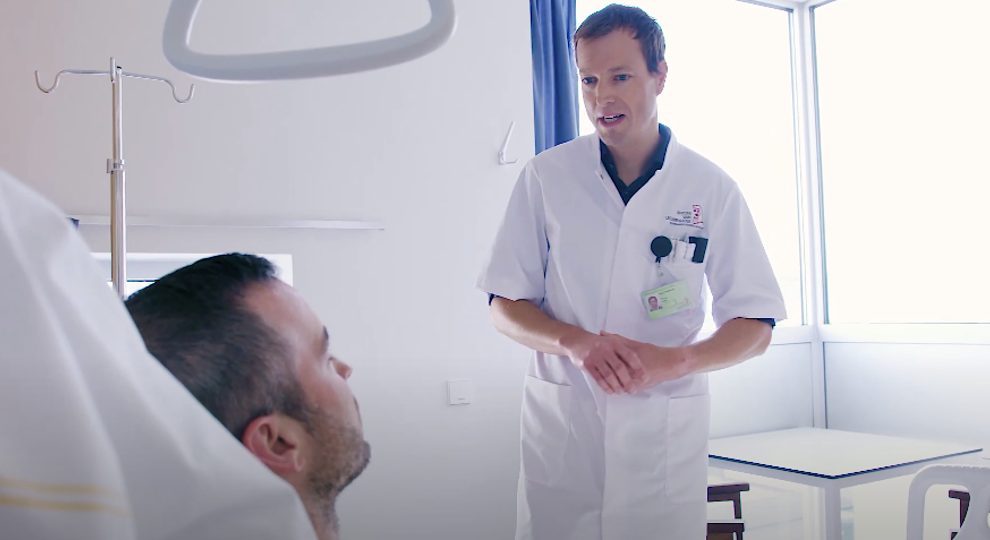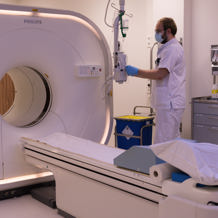Lung cancer
Lung cancer is a common cancer type. Every year, more than 12,000 people are diagnosed with this disease. The type of treatment you will receive depends on the type and stage.
Read more about the symptoms and the most common tests and treatments for lung and laryngeal cancer on this page, as well as the frequently asked questions.
Visit the NKI Lung Cancer Center to read more about our specialists, news, and innovation.

NKI Lung Cancer Center
Suspected lung cancer
People with lung cancer usually experience inconspicuous symptoms like coughing or fatigue. Because these symptoms are most commonly caused by the flu or a cold, most people wait a long time before they go see a doctor, which means that a diagnosis won’t be made until the illness has progressed.
Possible symptoms and signs of lung cancer:
- production of mucus or phlegm in the lungs;
- dry cough lasting several weeks;
- coughing up bloody mucus or rust-colored sputum;
- shortness of breath;
- chronic pneumonia that persists even after treatment with antibiotics;
- hoarseness without a sore throat;
- swelling of the neck or face;
- pain in the chest, back, or shoulder region.
Lung cancer is usually diagnosed at a different hospital, after which the patient is referred to the NKI for a second opinion consultation, or a transfer of treatment if the suggested treatment plan is not available at the current hospital.
Types of lung cancer
Lung cancer is an umbrella term for several types of cancer in the lungs. The most common type of lung cancer is non-small cell lung carcinoma (which occurs in approximately 80% of patients). Small cell lung carcinoma is less common and tends to be a more aggressive type of cancer.
Diagnosis
Your illness will be discussed during a multidisciplinary team meeting. This means that lung cancer specialists get together to discuss and decide on the best treatment for your specific case. We will openly and honestly inform you about the different treatment options, the rates of success, and the consequences. This allows you to make a well-informed decision on your preferred treatment plan.
Frequently asked questions
How can I request a second opinion at the NKI?
Please contact your practicing physician at your current hospital or your general practitioner. He or she can submit your request digitally through www.avl.nl/referring-clinicians, together with your medical history and test results. If applicable, any images can be submitted by mail on a CD-ROM. Once we have received your complete request, our medical team will discuss the material. It might take a while before we have received all materials. Our Planning department will contact you for an appointment.
What are the risk factors for lung cancer?
The primary risk factor for lung cancer is smoking. Second-hand smoke is another risk factor. Some other factors are air pollution, asbestos, or radioactive material.
Can I still develop lung cancer even if I have never smoked?
Anyone can develop lung cancer, even people who have never smoked, although the odds are much smaller. Non-smokers with lung cancer often develop a tumor because of a DNA mutation.
Is lung cancer hereditary?
Lung cancer is not hereditary. If lung cancer occurs multiple times in the same family, it is often caused by similar lifestyles and second-hand smoke. There are hereditary factors that increase the risk of developing lung cancer.
How can I detect lung cancer?
People with lung cancer often only experience symptoms once the tumor has progressed to a late stage. Common symptoms are a dry cough that doesn’t go away, a cough that produces blood, shortness of breath, lung infections that won’t go away, and pain in the chest. They often coincide with fatigue, a decrease in appetite, and weight loss. Please consider seeing your general practitioner if you are experiencing any of the symptoms listed above.
What are the different types of lung cancer?
The main types of lung cancer are small cell lung carcinoma and non-small cell lung carcinoma. 8 out of 10 people are diagnosed with non-small cell lung carcinoma while about 15% of patients present with small cell lung carcinoma. There are also other, even rarer types of lung cancer: mesothelioma and neuroendocrine tumors of the lung.
Mesothelioma, also known as pleural or asbestos cancer, is a malignant cancer type in the pleural cavity or lungs and airways. 85% of mesothelioma cases are caused by inhaling asbestos fibers, which led to the name “asbestos cancer”.
Another type of tumor that appears in the lungs is the neuroendocrine tumors of the lung. These tumors arise from cells in the neuroendocrine system.
Is immunotherapy an option for me?
If you have developed non-small cell lung cancer that has spread through the body (metastatic), immunotherapy may be an option for you. Your exact treatment options will depend on certain characteristics of your tumor, and any previous chemotherapy treatment you may have had. Immunotherapy helps the immune system recognize cancer cells so it can destroy them. Immunotherapy might be an option for you, or alternatively a combination of immunotherapy and chemotherapy. Your practicing physician can advise you about the best option for you and, if needed, refer you to a center where this treatment is available, like the NKI.
Is there a difference between Nivolumab, Pembrolizumab, and Atezolizumab?
Nivolumab, Pembrolizumab, and Atezolizumab are available for the treatment of lung cancer and are covered by insurance. Nivolumab is also sold under the brand name Opdivo®. Pembrolizumab is also sold under the brand name Keytruda®. Atezolizumab is sold under the brand name Tecentriq®. Nivolumab and Pembrolizumab attach to a different type of protein than Atezolizumab. Nivolumab and Atezolizumab can be prescribed as a treatment after chemotherapy. Pembrolizumab can also be prescribed as a primary treatment after a diagnosis of metastatic lung cancer. The doses administered may also differ: Nivolumab is administered once every 2 to 4 weeks and will take less than an hour per session. Pembrolizumab and Atezolizumab are administered once every 3 weeks and will take 30 minutes (if you respond well to the treatment).
Is targeted therapy an option for me?
Targeted therapy might be an option for you if you are diagnosed with stage 3 or 4 non-small cell lung carcinoma with a specific mutation – a change in the DNA that causes cancer cells to grow and divide. Ask your practicing physician whether targeted therapy is an option for you.
I have been diagnosed with small cell lung cancer. What are my treatment options?
Your treatment options are:
- Chemoradiation: a combination of radiation treatment and chemotherapy; followed by radiation of the head to treat potential metastases.
Small cell lung carcinoma is usually discovered at a late stage. The following palliative treatment types may be an option for you:
- Chemotherapy;
- Local radiation therapy for symptom management.
I have been diagnosed with non-small cell lung cancer. What are my treatment options?
Treatment options for non-small cell lung carcinoma are:
- Surgery;
- Radiation;
- Chemotherapy: usually delivered in addition to radiation therapy (chemoradiation) or surgery, or as a palliative treatment;
- Targeted therapy;
- Endobronchial therapy;
- Immunotherapy;
- A combination treatment.
Please consult your practicing physician to discuss which treatment is an option for you.
Will I get robotic surgery?
Some of our lung cancer surgeries are robot-assisted. We use the Da Vinci robot.
Are there any studies into new treatment options and would I qualify for participation?
Treatment as part of a trial may be an option for you. Please ask your practicing physician whether you qualify for participation.
 nl
nl
 Nederlands (Nederland)
Nederlands (Nederland)
 English (United States)
English (United States)






